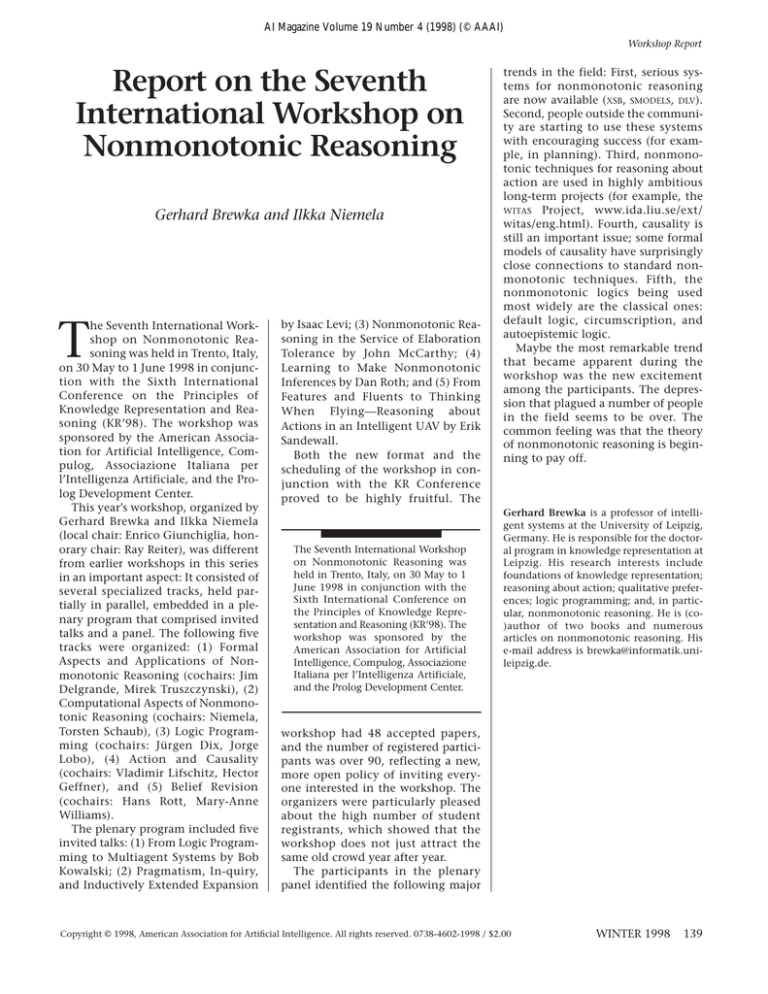
AI Magazine Volume 19 Number 4 (1998) (© AAAI)
Workshop Report
Report on the Seventh
International Workshop on
Nonmonotonic Reasoning
Gerhard Brewka and Ilkka Niemela
T
he Seventh International Workshop on Nonmonotonic Reasoning was held in Trento, Italy,
on 30 May to 1 June 1998 in conjunction with the Sixth International
Conference on the Principles of
Knowledge Representation and Reasoning (KR’98). The workshop was
sponsored by the American Association for Artificial Intelligence, Compulog, Associazione Italiana per
l’Intelligenza Artificiale, and the Prolog Development Center.
This year’s workshop, organized by
Gerhard Brewka and Ilkka Niemela
(local chair: Enrico Giunchiglia, honorary chair: Ray Reiter), was different
from earlier workshops in this series
in an important aspect: It consisted of
several specialized tracks, held partially in parallel, embedded in a plenary program that comprised invited
talks and a panel. The following five
tracks were organized: (1) Formal
Aspects and Applications of Nonmonotonic Reasoning (cochairs: Jim
Delgrande, Mirek Truszczynski), (2)
Computational Aspects of Nonmonotonic Reasoning (cochairs: Niemela,
Torsten Schaub), (3) Logic Programming (cochairs: Jürgen Dix, Jorge
Lobo), (4) Action and Causality
(cochairs: Vladimir Lifschitz, Hector
Geffner), and (5) Belief Revision
(cochairs: Hans Rott, Mary-Anne
Williams).
The plenary program included five
invited talks: (1) From Logic Programming to Multiagent Systems by Bob
Kowalski; (2) Pragmatism, In-quiry,
and Inductively Extended Expansion
by Isaac Levi; (3) Nonmonotonic Reasoning in the Service of Elaboration
Tolerance by John McCarthy; (4)
Learning to Make Nonmonotonic
Inferences by Dan Roth; and (5) From
Features and Fluents to Thinking
When Flying—Reasoning about
Actions in an Intelligent UAV by Erik
Sandewall.
Both the new format and the
scheduling of the workshop in conjunction with the KR Conference
proved to be highly fruitful. The
The Seventh International Workshop
on Nonmonotonic Reasoning was
held in Trento, Italy, on 30 May to 1
June 1998 in conjunction with the
Sixth International Conference on
the Principles of Knowledge Representation and Reasoning (KR’98). The
workshop was sponsored by the
American Association for Artificial
Intelligence, Compulog, Associazione
Italiana per l’Intelligenza Artificiale,
and the Prolog Development Center.
trends in the field: First, serious systems for nonmonotonic reasoning
are now available (XSB, SMODELS, DLV).
Second, people outside the community are starting to use these systems
with encouraging success (for example, in planning). Third, nonmonotonic techniques for reasoning about
action are used in highly ambitious
long-term projects (for example, the
WITAS Project, www.ida.liu.se/ext/
witas/eng.html). Fourth, causality is
still an important issue; some formal
models of causality have surprisingly
close connections to standard nonmonotonic techniques. Fifth, the
nonmonotonic logics being used
most widely are the classical ones:
default logic, circumscription, and
autoepistemic logic.
Maybe the most remarkable trend
that became apparent during the
workshop was the new excitement
among the participants. The depression that plagued a number of people
in the field seems to be over. The
common feeling was that the theory
of nonmonotonic reasoning is beginning to pay off.
Gerhard Brewka is a professor of intelligent systems at the University of Leipzig,
Germany. He is responsible for the doctoral program in knowledge representation at
Leipzig. His research interests include
foundations of knowledge representation;
reasoning about action; qualitative preferences; logic programming; and, in particular, nonmonotonic reasoning. He is (co)author of two books and numerous
articles on nonmonotonic reasoning. His
e-mail address is brewka@informatik.unileipzig.de.
workshop had 48 accepted papers,
and the number of registered participants was over 90, reflecting a new,
more open policy of inviting everyone interested in the workshop. The
organizers were particularly pleased
about the high number of student
registrants, which showed that the
workshop does not just attract the
same old crowd year after year.
The participants in the plenary
panel identified the following major
Copyright © 1998, American Association for Artificial Intelligence. All rights reserved. 0738-4602-1998 / $2.00
WINTER 1998
139





